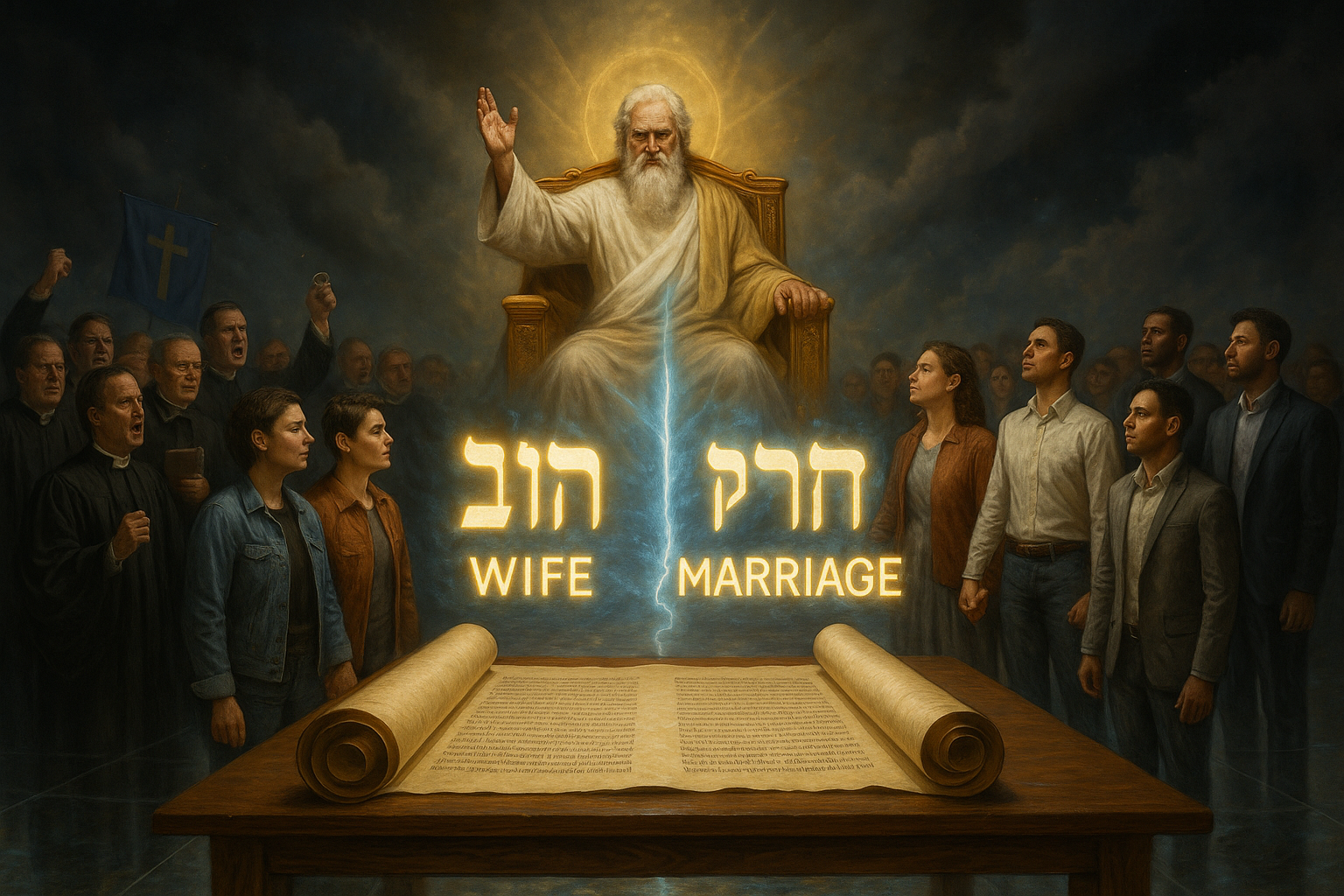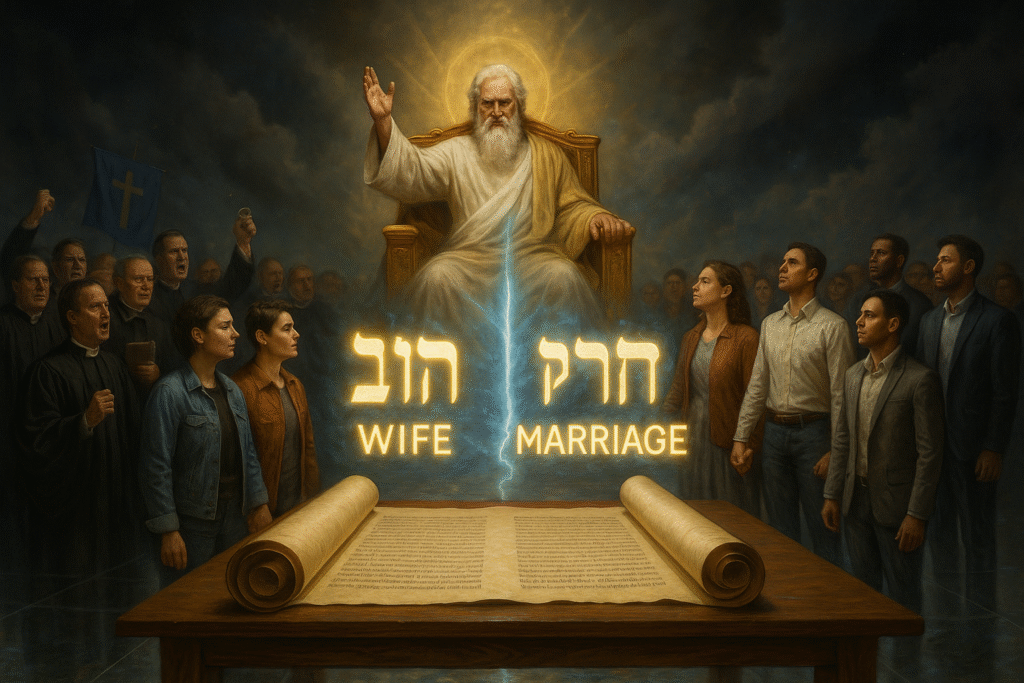Physical Address
304 North Cardinal St.
Dorchester Center, MA 02124
Physical Address
304 North Cardinal St.
Dorchester Center, MA 02124
With Michael Walker
With Michael Walker

A message to the Counterfeit…

Let’s start where you wish we wouldn’t: at the beginning, where the text is clean and the air hasn’t been polluted by your pamphlets. In Eden the language is not legal and it is not liturgical; it is living. The man beholds the woman and names what she is—ishah, woman, the feminine counterpart to ish—not “wife,” not a contract, not a ceremony, not a dress code, not a certificate. Then the design is spelled out without your church bulletin stapled to it: therefore a man will leave father and mother and will cling, dabaq, to his woman, and the two will become one flesh, basar echad. That verb is glue, not gavel; union, not paperwork; covenantal joining with a functional mandate to populate an empty world, not a human institution that needs ushers and signatures. And the law of first mention, the rule you parade when it suits you and bury when it doesn’t, seals the point: the first time joining appears it defines the category as divine, relational fusion with reproductive function in an unpopulated earth. What is not there is as loud as what is. Holy is not there. Sacred is not there. Ceremony is not there. The Bible is unembarrassed to call holy what is holy; it simply did not attach that adjective to Eden’s joining, and it certainly did not ordain the human edifice you have since built and then worshiped.
Now watch what happens the moment humanity starts naming relationships on its own terms. The first time your English Bibles drag in the word marriage, the Hebrew doesn’t say “marry” at all—it says take. Lamech took two women. Laqach. Acquisition language, not union language. Possession, not cleaving. The very first so-called “marriage” is polygamy wrapped in the vocabulary of property, and if the law of first mention means anything, it means this: the human thing later called marriage begins already fallen, already transactional, already structurally misaligned with Eden. The second time is worse. The sons of God saw the daughters of men were good to the eyes and took for themselves women from all they chose. Laqach again. Desire-driven selection. Cross-boundary unions so corrupt they serve as prelude to a flood. This isn’t a hymn to holy matrimony; it’s a police report from a crime scene. The third time? Abram and Nahor took women. Genealogical notation, acquisition without ceremony, still no divine cleaving in sight. The fourth? Pharaoh takes Sarai and only returns her under judgment. The fifth? Lot’s sons-in-law are literally “those taking” his daughters, another acquisition-in-progress. The sixth? Abimelech and Sarah; she is called be’ulat ba’al—possessed by a master—language that should make you blush before you sermonize about sanctity. The seventh? Isaac took Rebekah and she became to him as woman, and yes there is love, but the verbs are still acquisition not joining. The eighth? Abraham took Keturah. The ninth and tenth? Esau takes, and takes again, and takes again, stacking wives like trophies to solve family politics. Ten mentions, ten acquisitions. No holy. No sacred. No ceremony. No Edenic verb. Only laqach.
You want to argue this is nitpicking? Then pick up your favorite doctrine and hold it to the same standard, because you love the law of first mention until it exposes your scaffolding. The first mention of joining is divine union by cleaving; the first mentions of what translators dared to call marriage are human acquisitions by taking. The timeline refuses to bow to your narrative. From Eden to the patriarchs, “marriage” as a formal institution does not exist in the text; what exists are possession events and male-brokered arrangements. Only centuries later do we see anything resembling a ceremony with witnesses and a public frame—Samson’s weeklong feast in Judges and the redemption proceeding at the gate in Ruth. Those are social events you can finally, grudgingly, label as marriage in the cultural sense and insert wife without lying about the context. But even there, the Bible still refuses your favorite incense. Holy is absent. Sacred is absent. The words are not hiding. They simply aren’t there. Leviticus arrives long after the damage and regulates what man already invented—boundaries for who may take whom, property and inheritance controls, protections and prohibitions for a system birthed in laqach, not in dabaq. Regulation is not authorship. Restraint is not origin. God fenced a field He did not plant.
And when you race to the New Testament to rescue your castle with red letters, the Messiah does not back you up; He bypasses you. The first time marriage shows up in the Gospels it isn’t a legal thesis; it’s a parable about a king throwing a wedding feast—gamos in the plural, days of celebration, cultural imagery standing in for the kingdom. No holy, no sacramental treatise, no ecclesial ceremony manual—just a story. And then comes your favorite trap, the Pharisees with their divorce bait, and Yehoshua does the most devastating thing He could do to your institution. He ignores it. He does not argue case law at the level of your paperwork; He reaches past the centuries of laqach to the one verb that mattered before the fall. From the beginning, He says, the Creator made them male and female, and for this reason the man will leave and will be joined, syzeuchthēsetai, joined together, not married-off, not transacted, not taken into possession. He pulls the spine out of your registry and replaces it with Eden’s cleaving. He names Moses’ concessions for what they were—permissions carved into stone because your hearts were hard—and then He slams shut the revolving door men used to discard women like spent goods. The exception He grants is porneia, sexual betrayal of the union, precisely because He is upholding Eden’s joining, not rubber-stamping the mutated machinery you call marriage. The point is surgical: the Son of God refuses to sanctify man’s institution; He restores God’s union. If you miss that, it is because you are not looking for truth; you are shopping for ammunition.
Now for the twist you pretend not to see because it pulls your last crutch away. What does Scripture say about same-sex marriage? Nothing—because Scripture does not enthrone marriage in the first place. Man does. The Bible narrates your system, regulates your system, confronts abuses within your system, but it never pretends your system is the Edenic origin. The origin is union by cleaving under God’s presence. Your repopulation rhetoric collapses under its own weight in a world of eight billion souls, and it never did hold as a measuring rod for covenantal validity anyway, because if children are the precondition of a legitimate union, then every infertile couple in history is a divine violation. You do not believe that, and neither does God, who knows the frames He formed, including those who discover that their innate desire is toward their own sex rather than the opposite. You can keep calling them rebels to protect your own scaffolding, but the text you wield without understanding refuses to put holy on your institution and refuses to take holy away from a union simply because it fails your census math.
Do not mistake this for special pleading; it is simply the logic of your own rule applied to your own book. Law of first mention: joining is God’s design; marriage is man’s construct. Vocabulary: Eden speaks in dabaq; early Genesis speaks in laqach. Timeline: union originates in a garden with two persons and no courthouse; what you call marriage arrives later as possession, then gets fenced by law, then shows up as social ceremony, and never once earns the adjectives you fling around like confetti. New Testament calibration: Yehoshua references union, not institution; He curbs male abuse, not female worth; He heals hardness of heart rather than crown your registry with a halo. Therefore when you thunder against same-sex marriage as if Heaven itself penned your talking points, you are not defending Scripture; you are defending a human system that Scripture refuses to deify. If two image-bearers form a covenant to cleave—truly cleave, to become one flesh in the full sense of shared life, shared fidelity, shared burden, shared joy—that act imitates Eden’s pattern more faithfully than any ceremony that still reeks of laqach dressed up in tulle.
And if you cannot see that because your eyes are glued to the word wife inserted in places it did not belong until Judges provided a social frame, then hear it one more time without the perfume. In Genesis, wife was not a thing; woman was. In Genesis, marriage was not a thing; taking was. In Leviticus, marriage is still not a thing God created; it is a thing God restrained. In Judges, marriage becomes a human ceremony with witnesses, and even then it is not called holy, not called sacred, not crowned as sacrament. In the Gospels, the first “marriage” is a feast in a story, and the first doctrinal confrontation is a return to joining, not a benediction of your forms. Your thunder against same-sex covenant does not rise from the text; it rises from fear dressed as piety, from prejudice baptized as zeal. If the union resembles Eden’s cleaving—faithful, mutual, covenantal—then the critique that it “isn’t marriage” is the least relevant thing you could say, because marriage in the sense you mean is the least biblical part of this entire discussion.
So here is the in-your-face moment you keep shoving off for later. The Bible does not hand you a divine warrant to police the unions of those you despise. It does not call your institution holy, and it does not call their covenant unholy by virtue of not serving your census. It records a God who joined by cleaving, who regulated your machinery because you broke what you were given, who in the flesh pointed past your codes to the beginning and called you back to it. What offends you is not an affront to heaven; it is an affront to a system that never bore heaven’s name. And that, perhaps, is why you shout so loudly—because somewhere under the slogans you know that if Eden is the standard, then the question is not whether a union flatters your institution but whether it reflects God’s joining. Two people, cleaving, keeping faith, bearing one another’s weight, refusing to turn the other into property or a prop—that is the thing you were meant to defend and the thing you have consistently defaced.
Let the last word be as unceremonial as the first design. God made union. Man made marriage. Scripture honors the first and hems in the second. Holy and sacred never crown the verb to take; they never hover over the first italicized “wife.” The Messiah Himself sends you back to the joining and away from your legal gymnastics. So when you pound your pulpit against same-sex covenant, understand you are standing on a platform the Bible does not build. This deep dive does not invent that verdict; it exposes it. And if a ring must seal the lesson, etch it with what the text actually teaches: Put that on your ring finger.